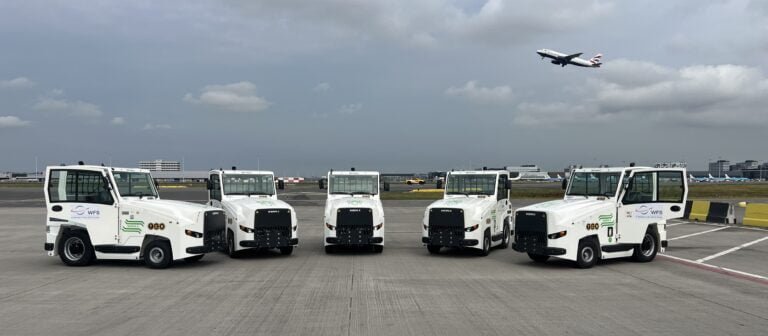Worldwide Flight Services (WFS), a member of the SATS Group, has become the first cargo handler at Amsterdam Airport Schiphol (AMS) to introduce electric cargo towing vehicles in the latest global initiative supporting SATS’ environmental, social and governance (ESG) group priorities.
Supplied by vehicle partner, TCR, the Goldhofer Sherpa E6 towing trucks are being used to support WFS’ ramp and cargo handling services for more than 50 airlines at AMS, which is one of Europe’s busiest air cargo locations. WFS operates four warehouse operations at AMS covering over 17,500 m² and incorporating dedicated Good Distribution Practice (GDP) and IATA CEIV Pharma certified facilities for temperature-controlled pharma products.
Goldhofer is a leading provider of sustainable and highly efficient aircraft and cargo towing solutions, aligning with the global environmental policies adopted with airports worldwide. The Goldhofer Sherpa E6 towing vehicle produces zero emissions and operates with low energy costs and quieter noise levels.
With more vehicles on order, WFS will be operating a completely all-electric fleet of towing vehicles in Amsterdam by the end of Q2 2025.
“This is the latest step in our sustainability journey and towards our zero emissions goal. As well as contributing to SATS’ and WFS’ ESG priorities, these new electric vehicles are also improving the working environment for our employees thanks to their low noise level and operating comfort. The improved tow hitch also improve safety and reduces the need for manual lifting,” commented Stéphane Scholving, Managing Director, The Netherlands at WFS.
Rob Spijker, TCR’s Manager Sales & Business Development, added: “In support of the ‘Roadmap Zero Emission Airside Operation in 2030’established by the Royal Schiphol Group in 2023, we are delighted WFS is the first cargo handler at Amsterdam Schiphol to introduce electrically powered cargo tractors. In collaboration with TCR, WFS tested several demonstration tractors before selecting the Goldhofer Sherpa E6. This electric cargo tractor delivers at least the same performance as the diesel tractors it replaces but without any emissions. WFS has also invested in a fast-charging system to fully charge empty batteries within 80 minutes to ensure optimum availability within its very busy handling operation.”
SATS and WFS are continually looking for collaborative sustainability partners and opportunities to help meet the group’s ESG targets. In Europe, many of WFS’ country-wide cargo handling operations are now powered by 100% renewable energy, while its operations are increasingly introducing electric tractors to move cargo between warehouses and aircraft as well as electric forklifts and other vehicles supporting cargo handling processes.
Other sustainability initiatives include using LED lighting in warehouse operations, packaging recycling programmes, eco-driving courses for employees to increase fuel efficiency, and the use of biodegradable plastic to wrap airfreight pallets.



